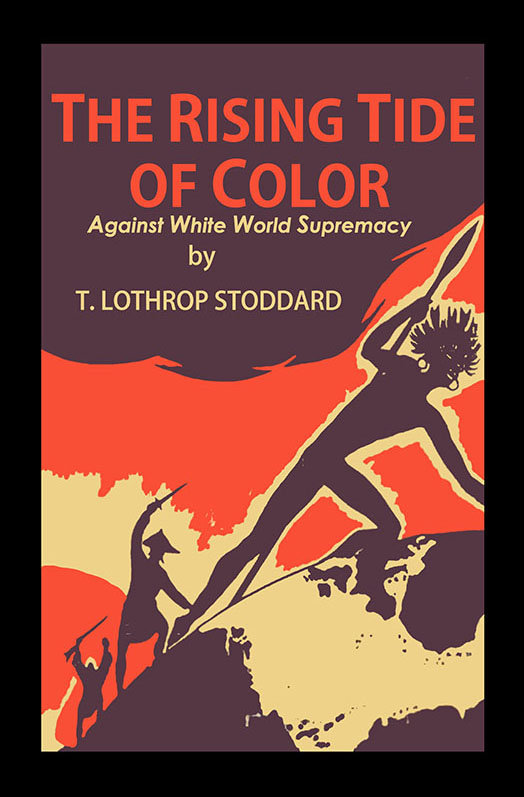
There can be no such thing as an evangelical Christian who is intentionally racist. This is true in the same way that there are no Muslim pig farmers, or Mormon brewpubs. Or vegan cannibals. Or feminist sex traffickers. You get the idea.
These things are not merely unlikely – they negate the very definition of the concept.
I recently read an opinion piece by a professor, Anthea Butler, suggesting that liberals should stop puzzling over why evangelical voters are (supposedly) so pro-Trump despite Trump’s flagrantly unchristian behavior. Her answer to this puzzle is simple:
We’re racists.
Professor Butler has a history of making ridiculous and extreme claims, but nonetheless, NBC news saw fit to give her false assertion a hearing. It’s a serious accusation, so just in case anyone is inclined to believe her, I’d like to explain why her assertion can’t be true.
It must be the case that Butler, and others riding the racist-labeling bandwagon, simply don’t know what an evangelical follower of Jesus is. Hopefully the following will be helpful.
Well Understood, Not Secret, Not Mysterious
By definition, evangelicals, white or otherwise, are followers of Jesus who consider the Bible to be authoritative. Look up “evangelical” in a dictionary if you doubt this. At the risk of sounding snarky, this means that they seek to follow what Jesus and His apostles taught in the Bible. If they don’t, then they are not evangelicals. They are something else.
But does the Jesus of the Bible have anything to say about race and racial superiority?
Yes. Tons, actually.
It so happens that Jesus’s greatest commandment and His “great commission” utterly rule out intentional racism. In fact, the defining statements of Jesus and His apostles, and their descriptions of where human history is heading, simply do not allow followers of Jesus to be racists. A racist may attend church, but to the extent that he or she harbors beliefs of racial superiority, he or she is not following Jesus. He or she is following someone else.
The clearly stated aims of Jesus presuppose racial inclusivity and equality. Here are a few indisputable examples:
The Greatest Commandment:
“…Teacher, which is the great commandment in the Law?” And [Jesus] said to him, “You shall love the Lord your God with all your heart and with all your soul and with all your mind. This is the great and first commandment. 39 And a second is like it: You shall love your neighbor as yourself. On these two commandments depend all the Law and the Prophets” (Matt 22:36-40).
The Great Commission:
“And Jesus came and said to them, “All authority in heaven and on earth has been given to me. Go therefore and make disciples of all nations, baptizing them in the name of the Father and of the Son and of the Holy Spirit, teaching them to observe all that I have commanded you. And behold, I am with you always, to the end of the age” (Matt 28:18-20).
Jesus’s Final Prayer for His Followers, Past and Present:
“I do not ask for these [1st c. disciples] only, but also for those who will believe in me through their word, that they may all be one, just as you, Father, are in me, and I in you, that they also may be in us, so that the world may believe that you have sent me… I in them and you in me, that they may become perfectly one, so that the world may know that you sent me and loved them even as you loved me” (John 17:20-23).
Paul Affirming that Social & Biological Distinctions are Obliterated in Jesus:
“…for in Christ Jesus you are all sons of God, through faith. For as many of you as were baptized into Christ have put on Christ. There is neither Jew nor Greek, there is neither slave nor free, there is no male and female, for you are all one in Christ Jesus” (Gal 3:26-28).
Paul’s Statement of God’s Ultimate Plan for Human History:
“In him we have redemption through his blood, the forgiveness of our trespasses, according to the riches of his grace, which he lavished upon us, in all wisdom and insight making known to us the mystery of his will, according to his purpose, which he set forth in Christ as a plan for the fullness of time, to unite all things in him, things in heaven and things on earth” (Eph 1:7-10).
John’s Revelation of the Future Age to Come:
“…After this I looked, and behold, a great multitude that no one could number, from every nation, from all tribes and peoples and languages, standing before the throne and before the Lamb, clothed in white robes, with palm branches in their hands, and crying out with a loud voice, ‘Salvation belongs to our God who sits on the throne, and to the Lamb!’… For the Lamb in the midst of the throne will be their shepherd, and he will guide them to springs of living water, and God will wipe away every tear from their eyes” (Rev 7:9-17).
For the evangelical follower of Jesus, unequivocal biblical statements like these must settle the issue.
Angel, Evangel, Evangelical, Evangelism
Notice the Great Commission verse about making disciples of all the nations. This undertaking of making voluntary disciples is called “evangelism.” The word “evangelist” literally means “bringer of good news,” (from eu- “good” + angelos “messenger”).
Notice how the word “evangelism” is part of the word “Evangelical”? That’s because Evangelicals are supposed to be evangelizing – spreading the good news of how Jesus has invited all of humankind to be restored to relational unity with God.
Furthermore, biblical evangelism is not about making brown people Western and white. Jesus specifically commanded that His followers spread His invitation to people of different ethnicities. Here’s a statement the resurrected Jesus made before His ascension:
“…and you shall be My witnesses both in Jerusalem, and in all Judea and Samaria, and even to the remotest part of the earth” (Acts 1:8).
Notice the progression: his disciples congregated in Jerusalem. The news then spread to the whole region of Jewish Judea. Then to the Samaritans, who were historically looked down upon as “half-Jewish.” Then to all the nations of the earth, including every “race.” There is simply no getting around the fact that God wants to include all people groups in His kingdom.
How Jesus Abolished the Notion of Racial/Ethnic Superiority
Perhaps the most stunning development among the first (Jewish) followers of Jesus is the fact that the (Jewish) apostles officially, as a matter of conscious policy, extended the invitation to salvation to non-Jews. This was a completely unexpected development coming from a group of Jewish followers of the Jewish Messiah, and it was not without some controversy. You can read the whole debate in the book of Acts, chapter 15.
Clearly, everyone assumed that non-Jews who wished to become followers of the Jewish Messiah would have to first become Jewish, and follow the Torah of Moses. However, through a series of signs from God, and as a result of seeing the ancient Hebrew scriptures in light of the actions and words of Jesus, the apostles reached their revolutionary agreement: the gentile nations could enter into Jesus’s new covenant and kingdom, as uncircumcised gentiles!
This development was so unexpected that the apostles thereafter referred to it as a “mystery,” meaning that it was unforeseen, and not clearly explained previously in their Jewish Torah and prophetic writings. Here is one example of (Jewish) Paul speaking of this “mystery”:
“When you read this, you can perceive my insight into the mystery of Christ, which was not made known to the sons of men in other generations as it has now been revealed to his holy apostles and prophets by the Spirit. This mystery is that the Gentiles are fellow heirs, members of the same body, and partakers of the promise in Christ Jesus through the gospel” (Eph 3:4-6).
Pretty clear.
The racially and ethnically inclusive nature of the message of Jesus is not optional. It is not a modern, liberal reading of the scriptures. It was there from the beginning. Any racism in the church of Jesus is a corruption of what Jesus taught. Even the Torah teaches that “all the families of the earth” descended from the same two parents (Gen 3:20; 9:18,19; 10:32). The gospel writer, Luke, affirms this in Acts 17:26.
Of course, one is free not to believe the Bible. My point here is not to prove that the Bible is true. My point is to prove that one cannot truthfully say that the Bible promotes racial superiority of any sort. In fact, the very concept of “race” is man-made, not biblical. There is no white supremacist version of evangelicalism.
History Cuts Both Ways
Historically, there certainly have been white church goers who have misused the Bible to justify slavery and racism. Those people have gone the way of the buffalo. Anthea Butler even acknowledges that the Southern Baptist denomination has repeatedly apologized for and repented of past evils. “But” she says, “statements are not enough.” Her proof that Baptists are insincere in their denunciations of past racial sins? They opened their 2019 Annual Convention with a gavel that was owned by the founder of their seminary, and who was also a slaveholder.
I would expect her to be more concerned with groups that were formerly openly racist, but that continue to exploit and decimate the black American population in the present. An example comes to mind:
For some reason white Darwinian “progressives” get a pass for misusing science to justify racism in much the same way that religious people misused the Bible to justify racism. During the early 1900s, there emerged a popular eugenics movement in America and Europe that was concerned with preserving (white) racial purity. It was a terrible and oppressive Orwellian episode of our history. Some 75,000 “unfit” Americans were forcibly sterilized in the name of racial hygiene and human betterment.
Margaret Sanger, founder of what is now Planned Parenthood, was on board with the eugenics movement. It’s difficult to prove whether or not Sanger was an overt racist, but in her autobiography she reports making a favorable impression at a speaking appearance to the wives of the KKK. She also welcomed Klansman and popular white supremacist author, Lothrop Stoddard, as a co-founder and board member of her American Birth Control League, (renamed the Planned Parenthood Federation of America (PPFA) in 1942).

Today, PPFA enjoys a solid “progressive” reputation as it renounces Sanger’s racist/eugenicist statements, just as evangelical denominations have renounced past racial sins. The difference is that PPFA continues to disproportionately terminate black lives, today.
Black women buy abortions at a rate 5 times that of white women, according the Guttmacher Institute. The reasons are unclear. Regardless, the American black population is significantly smaller than it would otherwise be if not for Sanger and PPFA, America’s largest abortion seller. Bishop Larry Jackson claims, “If we [blacks] had not aborted our children, we would be 30%, not 13%, of the population”.
I can’t prove that widespread black abortion also disintegrates belief in the sanctity of black human life in the black psyche, but I can’t imagine how it would help.
Having said this, I don’t believe that pro-legal-abortion ”progressives” are intentionally racist. But I would arguably be far more justified in leveling that accusation against them than those claiming that evangelicals are racist. Maybe both “progressives” and conservatives should focus on cleaning up their own houses when looking for racists to call out.
None of us lives out our compassion perfectly. All of us – white, black, or brown – harbor prejudice that we must work to overcome. We’ll all be more successful if we work together to overcome it.




